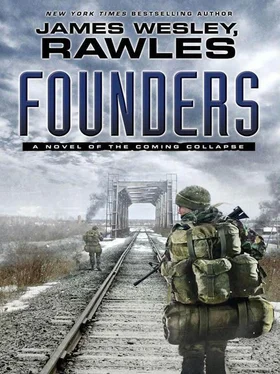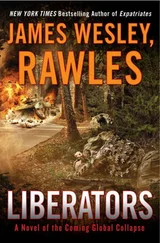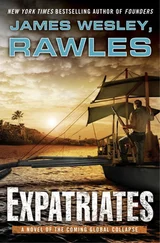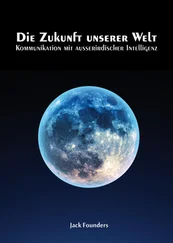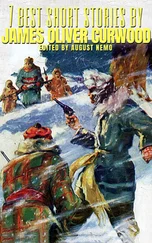James Rawles - Founders
Здесь есть возможность читать онлайн «James Rawles - Founders» весь текст электронной книги совершенно бесплатно (целиком полную версию без сокращений). В некоторых случаях можно слушать аудио, скачать через торрент в формате fb2 и присутствует краткое содержание. Город: New York, Год выпуска: 2012, ISBN: 2012, Издательство: Emily Bestler Books, Жанр: sf_postapocalyptic, на английском языке. Описание произведения, (предисловие) а так же отзывы посетителей доступны на портале библиотеки ЛибКат.
- Название:Founders
- Автор:
- Издательство:Emily Bestler Books
- Жанр:
- Год:2012
- Город:New York
- ISBN:978-1-4391-7282-7
- Рейтинг книги:5 / 5. Голосов: 1
-
Избранное:Добавить в избранное
- Отзывы:
-
Ваша оценка:
- 100
- 1
- 2
- 3
- 4
- 5
Founders: краткое содержание, описание и аннотация
Предлагаем к чтению аннотацию, описание, краткое содержание или предисловие (зависит от того, что написал сам автор книги «Founders»). Если вы не нашли необходимую информацию о книге — напишите в комментариях, мы постараемся отыскать её.
Founders — читать онлайн бесплатно полную книгу (весь текст) целиком
Ниже представлен текст книги, разбитый по страницам. Система сохранения места последней прочитанной страницы, позволяет с удобством читать онлайн бесплатно книгу «Founders», без необходимости каждый раз заново искать на чём Вы остановились. Поставьте закладку, и сможете в любой момент перейти на страницу, на которой закончили чтение.
Интервал:
Закладка:
They used the winch on the Unimog to pull the three shot-up vehicles off the road. Joshua filed a succinct after-action report that downplayed his own actions. A week later, he was summoned to General Woolson’s office, where he was awarded a Combat Action Medal and a field commission to the rank of second lieutenant.
13. Under Escort
“Since it’s not considered polite, and surely not politically correct to come out and actually say that greed gets wonderful things done, let me go through a few of the millions of examples of the benefits of people trying to get more for themselves. There’s probably widespread agreement that it’s a wonderful thing that most of us own cars. Is there anyone who believes that the reason we have cars is because Detroit assembly line workers care about us? It’s also wonderful that Texas cattle ranchers make the sacrifices of time and effort caring for steer so that New Yorkers can have beef on their supermarket shelves. It is also wonderful that Idaho potato growers arise early to do back-breaking work in the hot sun to ensure that New Yorkers also have potatoes on their supermarket shelves. Again, is there anyone who believes that ranchers and potato growers, who make these sacrifices, do so because they care about New Yorkers? They might hate New Yorkers. New Yorkers have beef and potatoes because Texas cattle ranchers and Idaho potato growers care about themselves and they want more for themselves. How much steak and potatoes would New Yorkers have if it all depended on human love and kindness? I would feel sorry for New Yorkers. Thinking this way bothers some people because they are more concerned with the motives behind a set of actions rather than the results. This is what Adam Smith, the father of economics, meant in The Wealth of Nations when he said, ‘It is not from the benevolence of the butcher, the brewer, or the baker, that we expect our dinner, but from their regard to their own interests.’”
—Economist and radio talk show host Dr. Walter E. Williams, from his essay “Markets, Governments, and the Common Good”Bradfordsville, Kentucky
April, the Second Year
As the war of resistance grew, Sheila Randall took some calculated risks. She allowed her store to be used as a transit point for couriers. She also continued to trade in ammunition, donating considerable quantities to the Resistance, including any that was in prohibited categories (military calibers, full metal jacket, tracer, incendiary, or armor piercing). On three occasions, she sheltered wounded resistance fighters in the store’s upstairs apartment, once for more than a week. She also passed along tidbits of information that she picked up in talking with customers.
Sheila’s main contact with the Resistance was through Hollan Combs. A retired soil scientist and a widower, he said that he was the perfect resistance fighter. He reasoned, “I’ve got no kin, and I’m too old and crippled up to run. That leaves me just the option of standing to fight, since I’m too ornery to do anything else. This is a war that’s best fought by young men who haven’t yet married, and old farts like me, with nothing left to lose.”
Deputy Dustin Hodges of the Marion County Sheriff’s Department was Sheila’s other key resistance contact. Although most of the other deputies and the sheriff himself sympathized with the Resistance, the department put on an outward show of supporting the ProvGov. Hodges regularly fed Sheila information that she summarized in handwritten spot reports. These were passed along to the couriers. It was through Dustin that Sheila got advance warning of many planned government policies. She returned these favors by letting Dustin buy certain items at cost.
West Branch, Iowa
April, the Second Year
The next few months were quiet at the Perkins farm. They had to warn off more than a dozen groups of refugees who had displayed uncertain motives. Two warning shots were fired. Most of these groups were traveling on foot. With a hand-painted sign that he posted on the gatepost, Durward directed refugees to their Society of Friends (Quaker) church house on North 6th Street. Since just after the Crunch, the Perkinses had secretly supplied the church with more than 3,000 pounds of corn and soybeans to distribute to refugees and to needy people in the community.
In most instances, refugees would stop, read the sign, and move on. But often they would try to send a “representative” to the house, hoping for a direct handout. A warning shot would usually suffice to send that individual scurrying back over the gate and the whole group packing. A few times there were hostile shouts, but inevitably the refugees would leave. Durward was mistrustful, so he kept the cows locked up in the barn every night.
In late April, as the spring rains became less frequent and the weather warmed, Ken and Terry prepared to move on. The Perkinses supplied them with as much beef jerky and pemmican as they could carry, supplemented by a few raisins and canned fruits. Durward also wrote a letter of introduction, describing their work for him. They were also given road maps for seven western states that would cover potential routes to the Idaho retreat.
At dusk on the evening of April 7, by the light of a quarter waxing moon, Ken and Terry headed west. They again traveled at night, mainly along railroad tracks and, as needed, cross-country. They skirted wide around Iowa City, via the north shore of Lake MacBride. They then walked north and followed the Canadian Pacific Railroad line westward. These were tracks formerly owned by the Iowa, Chicago, & Eastern Railroad. They followed the tracks west through a succession of small towns: Fairfax, Norway, Luzerne, Belle Plain, Chelsea, Tama, Montour, and Marshalltown.
As they approached Marshalltown, Ken pointed out a large water tower in the distance and said, “I feel sorry for towns like this, with the power grid down. Almost everywhere that you see a water tower, that means that they relied on electric pumps—to pump it up there, to create a ‘head.’ When the grid went down, most towns only had a four- or five-day supply of water. So except for towns that are near hydroelectric dams and that were able to reestablish power quickly, the residents were out of water. With toilets not flushing, that must be a sanitation nightmare in any town of appreciable size.”
Terry asked, “So what percentage of the population of the United States is on municipal water systems that are gravity-fed, from end to end?”
“Probably less than 2 percent. The EPA raised their standards to require filtration for most water—because of turbidity testing—so they added pumps to a lot of municipal water systems that had been gravity-fed. Maybe they were able to take those pumps and filters out of the system and revert to all gravity flow in some places. But nearly everybody else is collecting water from rain barrels from their roofs, or gathering it out of streams and ponds. Even people with well water are going to be out of luck after they run out of fuel for their generators. People like Todd and Kevin in Idaho—with either gravity-fed spring water or a photovoltaic well pump—have got to be a tiny minority. So close to 95 percent of the population is toting water by hand every time they want to do laundry, wash dishes, or flush a toilet. Think of the collective drudgery that represents.”
As they walked through the outskirts of Marshalltown, Ken and Terry were halted by two police officers who stepped out of a police cruiser with riot guns. One of them aimed a spotlight from their cruiser at Ken and Terry. The Laytons stopped and raised their hands.
“Hold it there,” one of the officers warned. “Open carry of firearms is banned inside city limits.”
Читать дальшеИнтервал:
Закладка:
Похожие книги на «Founders»
Представляем Вашему вниманию похожие книги на «Founders» списком для выбора. Мы отобрали схожую по названию и смыслу литературу в надежде предоставить читателям больше вариантов отыскать новые, интересные, ещё непрочитанные произведения.
Обсуждение, отзывы о книге «Founders» и просто собственные мнения читателей. Оставьте ваши комментарии, напишите, что Вы думаете о произведении, его смысле или главных героях. Укажите что конкретно понравилось, а что нет, и почему Вы так считаете.
